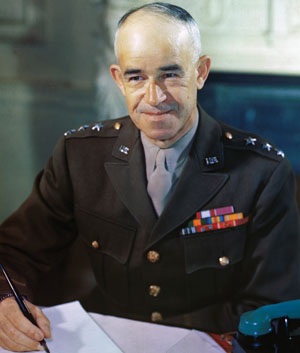BRADLEY, OMAR (1893–1981)

Like Dwight D. Eisenhower, Bradley graduated from the U.S. Military Academy at West Point in 1915 and held various staff and instructor positions in the interwar years. (The influenza pandemic and the armistice prevented Bradley from serving in Europe in World War I.) On several occasions Bradley taught at West Point. He served directly under Army Chief-of-Staff George Marshall prior to the outbreak of World War II. He commanded several divisions preparing for combat in the early part of the war. After Operation Torch, the North African landings in November 1942, Gen. George Patton requested the services of Bradley, who received his first front-line command as the head of the U.S. II Corps, formerly Patton’s command. He continued to command the II Corps in the invasion of Sicily (Operation Husky).
Bradley, now a lieutenant general, was posted to England in September 1943 to take part in the buildup to the Normandy landings (Operation Overlord). In January 1944 Bradley was chosen to command the U.S. 1st Army, which alongside the British Second Army, made up Gen. Bernard Law Montgomery’s 21st Army Group. Bradley commanded three corps directed at the two American beaches, Utah and Omaha. Bogged down after coming ashore, Bradley engineered Operation Cobra, the breakout that saw the Allies sweep across France. That July Bradley assumed the command of the U.S. 12th Army Group, the largest and most powerful United States Army formation ever to take to the field. It controlled the majority of American forces on the Western Front in 1944 and 1945: the First U.S. Army under Gen. Courtney H. Hodges, the Third U.S. Army under Gen. George S. Patton, the Ninth U.S. Army under Gen. William H. Simpson, and the Fifteenth U.S. Army under Gen. Leonard T. Gerow. By V-E Day, the 12th Army Group was a force that numbered over 1.3 million men.
Bradley was not first-rank in terms of pure generalship, but the qualities he had were similar to those of Eisenhower in that the two men had tact and calmness that proved vital in dealings with both egotistical Patton and egotistical Montgomery. (Montgomery famously praised Bradley by saying that he was “dull, conscientious, dependable, and loyal.”) Like Eisenhower, Bradley was a superb organizer and planner and had a genuine and deep-felt compassion for the ordinary GI even though he did not visit front-line troops all that much. After war correspondent Ernie Pyle called him the “GI’s General” in several dispatches, Bradley became known by that title.
Bradley was the last five-star commissioned officer of the United States, a rank historically held by only five men. In 1949 he was the first general to be selected Chairman of the Joint Chiefs of Staff, a position that outranks all other officers in the American armed forces.
![]()
General Omar Bradley, Department of Defense Video
![]()

 History buffs, there is good news! The Daily Chronicles of World War II is now available as an ebook for $4.99 on Amazon.com. Containing a year’s worth of dated entries from this website, the ebook brings the story of this tumultuous era to life in a compelling, authoritative, and succinct manner. Featuring inventive navigation aids, the ebook enables readers to instantly move forward or backward by month and date to different dated entries. Simple and elegant! Click
History buffs, there is good news! The Daily Chronicles of World War II is now available as an ebook for $4.99 on Amazon.com. Containing a year’s worth of dated entries from this website, the ebook brings the story of this tumultuous era to life in a compelling, authoritative, and succinct manner. Featuring inventive navigation aids, the ebook enables readers to instantly move forward or backward by month and date to different dated entries. Simple and elegant! Click 











